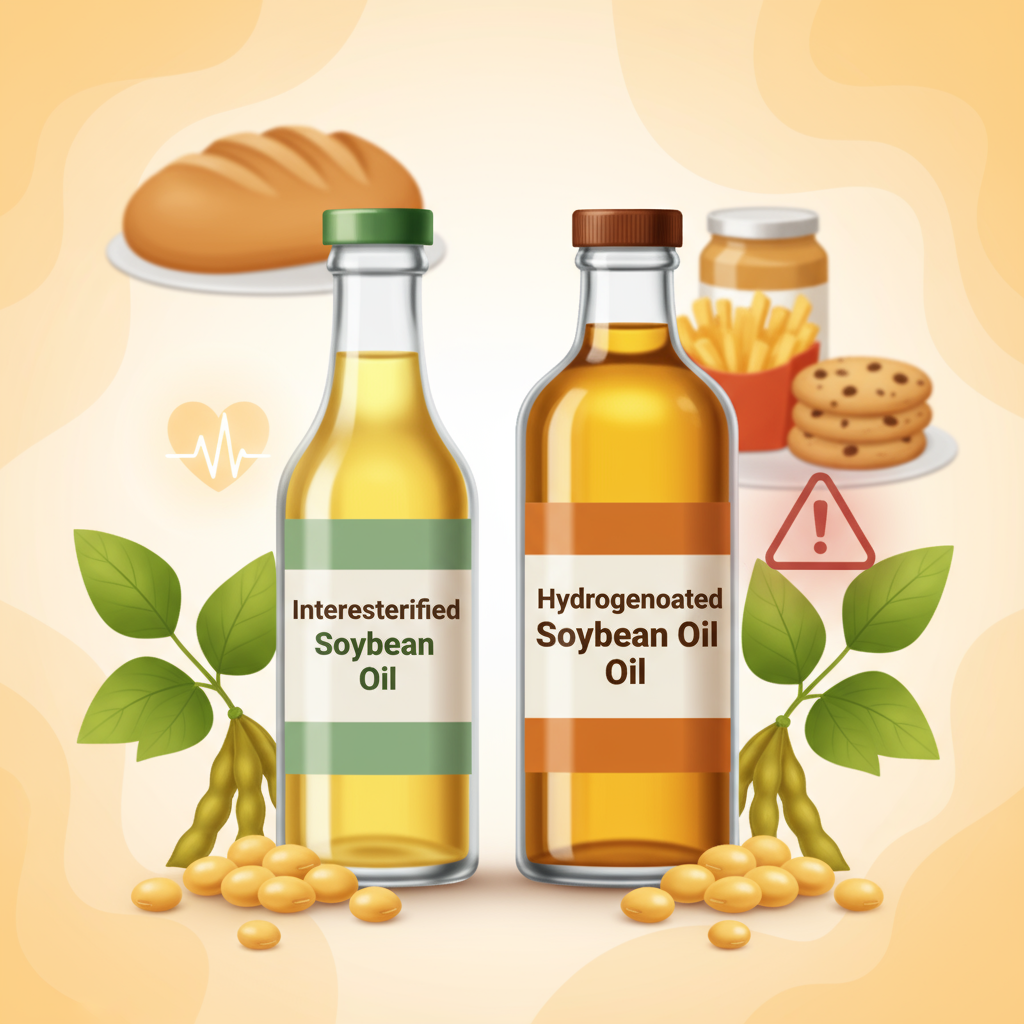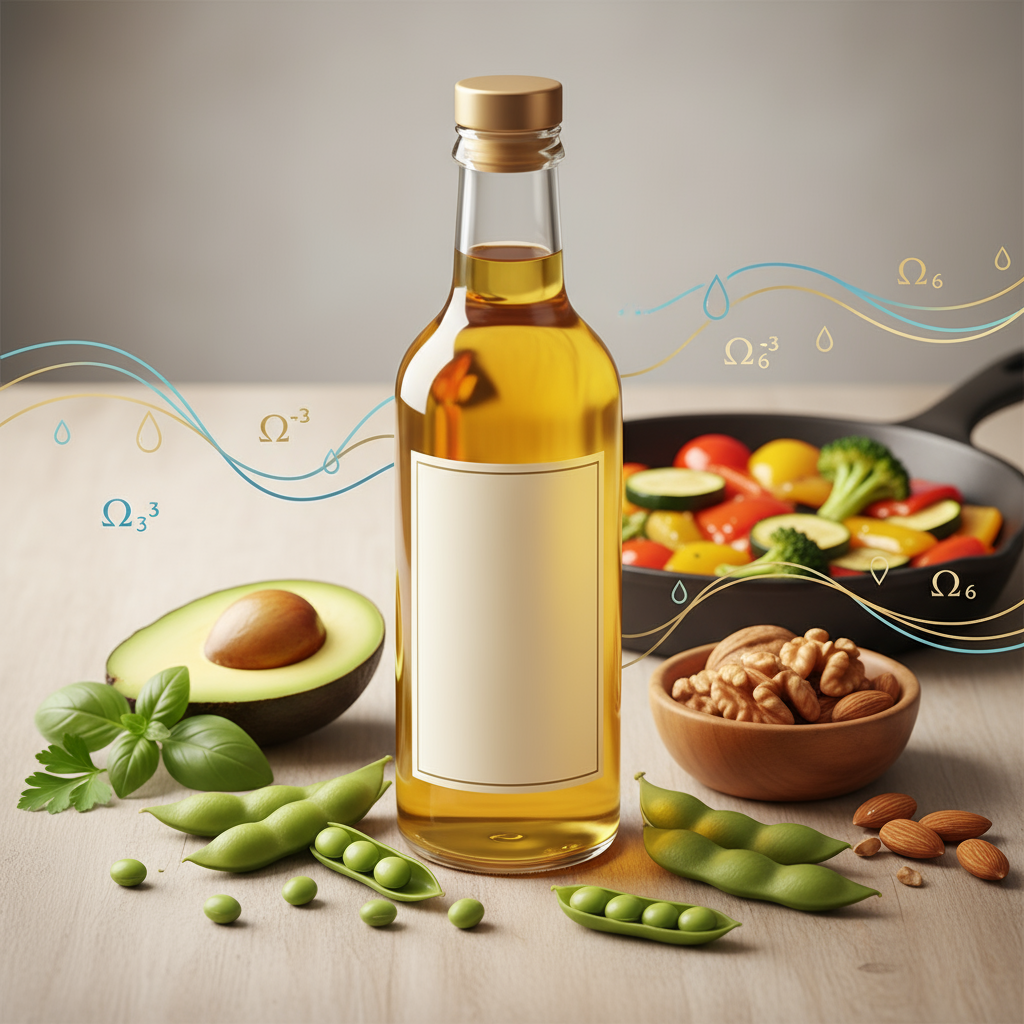
Interesterified Soybean Oil vs. Hydrogenated Soybean Oil: What You Need to Know
TL;DR
Interesterified soybean oil and hydrogenated soybean oil are two types of fats used in food production. Interesterification involves rearranging fatty acids in triglycerides to modify their properties without creating trans fats, while hydrogenation alters the oil's structure to create a more solid fat, but can produce unhealthy trans fats. Both methods aim to improve the functionality of oils in food products, but they come with different health implications that are still under investigation. Current research suggests that interesterified fats may have metabolic impacts that warrant further study.
With growing concerns over trans fats and their health implications, food manufacturers are increasingly turning to alternatives like interesterified and hydrogenated oils. Both types of oils are derived from soybean oil but undergo different processes that affect their chemical structure and health impacts. This article will explore the differences between interesterified soybean oil and hydrogenated soybean oil, their applications in the food industry, and their potential health effects.
Interesterified soybean oil is produced through a process called interesterification, where the fatty acids in triglycerides are rearranged. This can be done chemically or enzymatically and results in a fat that has modified melting properties and stability without generating trans fats, which are known to pose health risks (Source: PMC).
While interesterified fats are marketed as healthier alternatives, recent studies suggest they may still pose health risks. Some research indicates that diets high in interesterified fats could lead to increased blood glucose levels and altered cholesterol profiles, raising concerns about their long-term health implications (Source: Science News).
Hydrogenated soybean oil is produced through hydrogenation, a process that adds hydrogen to the oil to convert liquid fats into solid or semi-solid forms. This process can result in the formation of trans fats, which are associated with numerous health risks, including increased levels of LDL (bad) cholesterol and decreased levels of HDL (good) cholesterol (Source: PMC).
The primary concern with hydrogenated oils is their potential to contain trans fats. Studies have shown that trans fats can significantly increase the risk of heart disease and other metabolic disorders (Source: Science News). Due to these risks, many countries have implemented regulations to reduce or eliminate trans fats from food products.
Both interesterified and hydrogenated oils have implications for cardiovascular health, but they differ in their mechanisms:
Currently, there is no requirement for food manufacturers to label interesterified fats, making it difficult for consumers to make informed choices. In contrast, hydrogenated oils must be labeled, allowing consumers to avoid them if they wish (Source: Science News).
Both interesterified and hydrogenated soybean oils serve important roles in food production, but they come with distinct health implications. While interesterified oils are promoted as a healthier alternative to trans fats, emerging research suggests they may still carry risks that require further investigation. Hydrogenated oils, on the other hand, are known for their adverse health effects due to trans fat content. As consumers become more health-conscious, understanding these differences is crucial for making informed dietary choices.
Interesterified soybean oil is produced by rearranging fatty acids in triglycerides without creating trans fats, while hydrogenated soybean oil is made by adding hydrogen to convert liquid fats into solid forms, which can produce trans fats.
Interesterified oils do not contain trans fats and are marketed as healthier alternatives, but emerging research suggests they may still pose health risks, such as increased blood glucose levels. Hydrogenated oils, on the other hand, are known to contain trans fats, which are linked to heart disease.
Interesterified oils are used for their improved texture and stability in products like spreads and baked goods, while hydrogenated oils provide the solid texture needed for baked goods, margarine, and shortening.
Currently, interesterified oils do not require labeling, making it hard for consumers to identify them. In contrast, hydrogenated oils must be labeled, allowing consumers to avoid them if desired. Understanding these differences is essential for making informed dietary choices.

Is Soybean Oil Keto-Friendly?
TL;DR Yes, soybean oil is keto-friendly due to its zero carbohydrate content, making it suitable for a ketogenic diet. While it can fit into your keto meal plan without disrupting ketosis, it's essential to consider the overall ba...

How Much Does Soybean Oil Weigh Per Gallon?
TL;DR A gallon of soybean oil weighs approximately 7.6 pounds. This weight can vary slightly depending on the oil's temperature and density, but 7.6 pounds is a widely accepted average. Understanding the weight of soybean oil is e...

Where Can I Buy Soybean Oil? A Comprehensive Guide
TL;DR Soybean oil is widely available at various retail locations and online. You can purchase it at grocery stores like Walmart, specialty food stores, and online platforms such as Centra Foods. It is commonly used for cooking an...

Does Soybean Oil Contain Soy? Understanding the Relationship
TL;DR Soybean oil, derived from soybeans, is a common cooking oil that may raise concerns for individuals with soy allergies. While highly refined soybean oil typically does not contain significant amounts of soy protein and is ge...
Ready to source an ingredient?
Whether you’re struggling to find the perfect ingredient, racing against the clock, or simply don’t have the bandwidth to manage sourcing — we’ve got your back.
Get a Free Sourcing AuditSavings is BIG but the relationship value is MASSIVE! Glad we met when we did. Looking forward to building this partnership with you and David.
Yohan, here to say you’re one of my favorite suppliers. Aside from your high quality ingredients, you’re so great to work with. Thanks for all the help you’ve given us this year.
Working with Global Savors and Yohan has been very smooth when sourcing ingredients. They offer a great selection and and cost savings! Yohan has been awesome to work with and we look forward to continuing business together.






Global Savors is your trusted partner for seamless ingredient sourcing, offering end-to-end solutions that streamline procurement, simplify logistics, and elevate your supply chain efficiency.
View More News
© 2026 Copyrights by Global Savors. All Rights Reserved

